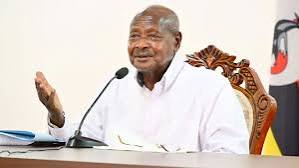
THE MUSEVENI HOMILY
By Femi Olugbile
Recently the grand old man Yoweri Museveni, President of the Republic of Uganda, was in Kenya to attend the World Bank Group’s International Development Association Summit (IDA21) for African Heads of States. Present were the Presidents of 19 African countries. Nigeria was represented by Vice President Kashim Shettima. The President of the World Bank, Ajaypal Singh Banga was also there.
The event took place at the imposing Kenyatta International Convention Centre in Nairobi.
The focus of the gathering was sustainable development for Africa.
Museveni, an old African dictator in the classical mode, looked all his years as he was called to the dais to make the ritual speech. He was not the corpulent, physically ebullient man of old. But his mind was clear, and his words came out with the blasé air of someone who had ‘been there, done that’. He had survived Idi Amin and Milton Obote. As President, he fought a bruising war against the Lord’s Resistance Army, one of the most insane, murderous gangs ever to be unleashed on the masses of any country.
Museveni was entitled to show signs of ‘wear and tear’. He would be eighty years old in another five months. He has been in power since the 26th of January 1986, and was one of the longest-serving heads of states in the world. His rule, on the platform of his party – the National Resistance Movement, has been described as an ‘illiberal democracy’, characterised by authoritarianism and nepotism. His son was the head of the nation’s army, and his wife Janet was the Minister of Education and Sports.
A certain sense of French King Louis XIV’s alleged averment – ‘l’Etat c’est moi’ came through in his manner.
He spoke of philosophical, ideological and strategic mistakes that have culminated in the predictable collapse of some African states. He affirmed the superior merit of seeking prosperity, instead of profiteering as the basis of trade between nations. ‘Aid’, he said, has all too often been for ‘profiteering’, against Africa. He parodied the concept of ‘Sustainable Development’ as an assumption of permanent movement without actual transformation and real growth for African nations, because ‘growth factors are not funded’.
With some reluctance, he accepted the need for private sector-led growth, but he insisted that there must be low cost of production for it to succeed.
He put forward four pillars required for that success.
One of these was low transport costs, which for him was synonymous with a good railway network.
‘If you don’t fund the railway, how will you get low transport costs’ he asked.
He threw his age and experience at the audience.
‘I have been here for the past sixty-four years…as a student leader, as a freedom fighter, now as leader of a country… How many railways have been funded in Africa?…’
His second pillar for transformation was electricity.
‘You must have low-cost electricity, not exceeding five cents per kilowatt/hour…’
The cadence of his voice did not change even as the content became more acerbic.
‘…I’m tired of all these …neo-colonial Civil Servants….’
He poured scorn on the African penchant for borrowing international funds for ‘Capacity Building’, which was encouraged by international donors.
‘…They put you in hotels where you eat chapatis…’
His third point was that there must be accessible funding for private Industry at concessionary prices.
‘They tell you to go to commercial banks…The only person who can borrow money and pay it back from a commercial bank is a trader who goes to China…to buy goods, sells them quickly and pays back…’
There was a dire need for funding for irrigation to stabilise agriculture in East Africa.
‘A loan for Seminars, very easy to get…for irrigation you don’t see…’
Finally, according to Museveni, a large percentage of the African population was on subsistence economy, ‘producing only for the stomach’.
‘Everybody must be helped to join the money economy…’
He ridiculed the focus of Aid that African countries sought and obtained from donors.
‘…neo colonial Civil Servants talk of import-support…Why don’t you tell me about import-substitution and export promotion?’
‘One of the major problems is Africa producing raw materials.’
He cited coffee.
‘…The global value of the coffee economy is $460 billion. All the coffee-producing countries get $25 billion of that. Africa gets $2.5 billion…Germany, which has no coffee, earns $65 billion…I sell a kilo of coffee for $2.5. Someone in London will get $241 from that one kilo…. Coffee roasting, coffee grinding, coffee packing must happen here in Africa…’
He painted a similar picture concerning Cotton production- both for value addition to make textiles and job creation for the people.
He went further:
‘Africa produces what it does not consume and consumes what it does not produce’.
To him, it was modern-day slavery.
On minerals he said:
‘…I banned the export of unprocessed minerals from Uganda…You wait until I go away, then you can steal the minerals…’ he told his Civil Servants.
‘An Indian wanted to take our iron ore to India to make steel…A ton of iron ore is sold for $47…A ton of steel costs $700…I banned them… they are flocking in now…They have opened seven good refineries…’
He mentioned tin, which has been exported raw from colonial times.
‘This haemorrhage of Africa must stop…’
He was done.
As he took his leave, the applause was vigorous.
The old African dictator was presenting a vision of personalised, paternalistic ‘Big Government’ which many in his audience were trying to steer their countries away from, in favour of ‘Free Markets’, ‘Deregulation’ and ‘Liberal Democracy’. But his four points had struck home and would continue to agitate their minds. They would remember Burkina Faso and Mali, and the existential danger inherent in a failure to meet at least some of the demands of the masses. Perhaps some would think afresh to see what elements they could borrow, whatever ideology or democratic pretensions they espoused.
For this day the weather-beaten old warrior had stolen the show.
